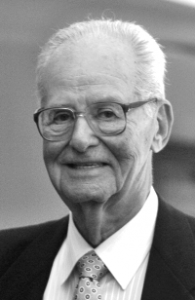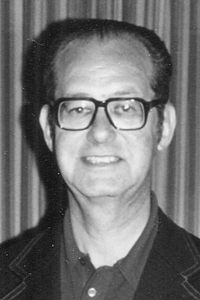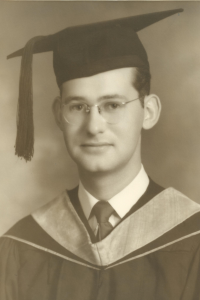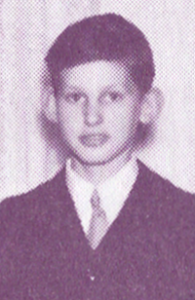Eulogy by Rabbi Amy Ehrlich
Sey.
Not my father or step father; I called him “My Seymour.” He always greeted me with a broad smile, rosey cheeks, an embrace – and the question: “How’s your Yiddish?”
It’s easy to see why my mother, Helen, loved him. Sey was so sweet and so kind, gentle and easy going. They were brought together through Bernice, Sey’s wife of 49 years and mom’s college roommate. Helen and Sey had similar backgrounds and much in common so it was understandable that they would choose to be together.
I loved Seymour not only for the sweet man he was but for the joy and companionship he shared with Mom. It was a pleasure to see how they enjoyed each other’s company, and inspiring to see how they made a new start together. She was his supporter, social planner and constant companion. And I don’t need to tell you how she loved him and cared for him and worried over him. Next week would have been their 10th anniversary. I find that incredible because it seems like Sey was always part of our lives.
With mom’s encouragement, Seymour began to play bridge; they traveled – just a bit. They escaped the Connecticut winters in favor of sunny Florida, which Seymour loved. Each morning he would relish the sunshine, do Sudoku and take in the tropical surroundings with undiminished enthusiasm. It was, as he claimed, Paradise.
Our families grew together, sharing some holidays, milestones, overlapping visits. I can picture Sey at the Seder table, telling us about his early years in Hartford. I remember his pride in discussing the Saltzman genealogy. It was more than just personal history; he traced his roots back to Rashi, one of the most important Jewish scholars of all time! Sey would say, with satisfaction, “ Now that’s yichus.” His genealogical efforts brought together two things he treasured: his Jewish identity and family. Seymour knew that our strength was in family. A family we were honored to join and come to know, and love.
With David nearby, Seymour would revel in their shared love of gardening, spending hours tending each vegetable bed, giving each variety all the care and attention necessary for a satisfying harvest. In truth, the garden nurtured their relationship, too. Most Friday evenings, David and Ana would have Shabbos dinner with Mom and Sey, a ritual that Sey treasured.
Lisa’s visits were a welcome treat. Her decision to live in Israel mirrored his own passion for Israel – and for Judaism. He was so proud of her and her family. Sey took delight sharing stories with us about Doron, Smadar, and Amit. He was enchanted by Israeli life and shepped nachas from their military service and their devotion to Israel, a country he loved. “Imagine,” he would say to us, “my grandchildren are Sabras.” Their visits left him floating.
As a professor, Robert, achieved the pinnacle of scholarship, something Sey admired. Sey looked forward to their annual visits to the Lake because that meant he would have plenty of time to catch up with Robert and Beth – and see how Jonathan and Daniel had grown. The summer couldn’t come soon enough for Seymour because that meant Robert would be home once again.
Happily, my siblings and I became part of his extended family. Sey welcomed us!
Richard and Sey shared a love for family genealogy and they would have conversations which seemed to have no end; Michael and Sey would always enjoy some sweet jokes and light hearted exchanges.
Sey and Joe loved to talk medicine and reminisce about their beloved alma mater, Wesleyan. Joe was impressed by Sey’s medical knowledge as well as his academic achievements at college and in medical school. He would tease Sey about their Wesleyan bonds and try to get him back on campus.
Ruth and Susan, Joey and Ally, Robbie, Dan and Jake – we all looked forward to spending Thanksgiving weekend together at the shore, where Sey would take quiet satisfaction in trouncing us in bowling. “Would you look at that?” he would exclaim, as his scores soared from frame to frame. He would smile with pleasure, chuckling over his skills, and encouraged us as we attempted -and failed- to match him. We enjoyed birthdays as well as holidays together and sometimes just a quiet weekend, for no reason at all. Sey took an interest in each one of us and made an effort to embrace us as his own.
Harry is the only grandchild that Sey and Mom share since he was born after their marriage. Sey called him Tiger – or Hershel. Both Mom and Sey share the name Hershel. Sey got a kick out of calling Harry Hershel, too (even though his name is Haim). Harry says that Grandpa has the best jokes; we might say the corniest. The image of the two of them, Grandpa and Tiger, holding hands, walking out to the garden to pick cucumbers or vegetables is even sweeter than Sey’s perfect tomatoes.
Becca, Joey and Ally’s daughter is Seymour’s great granddaughter – and her birth strengthens a special bond with Ally’s grandparents, Marshall and Jean Ellman, also lifelong Hartford residents as well as friends of long standing.
When Sey took my hand I often thought of what he was like as a physician and imagined that being in his care gave his patients a sense of confidence and well-being. Seymour was just that, for us. He was that calm. His hands cared for so many in the community. He touched and healed generations of people. Those hands welcomed them into the world. Sey was at their side, nursing them through illnesses. He comforted them and shared his strength with people who relied on him, always. All that was communicated by being hand in hand. Seymour was beloved.
Sey was there when you needed him. It gave him pleasure to help. That’s just how he was put together. Sey didn’t need things to define his identity or to make him happy. He sought to make the world better through his efforts. That was reward enough.
Given the last three months, it is easy to focus on the challenges he faced. And he met them with a fortitude that most of us could not summon. During a recent visit, Sey brightened up when he saw Harry and he summoned all his energy to greet him. Afterwards, Harry turned to us and said: Grandpa has courage. And he did.
In the Talmud we learn that it isn’t necessary to set up a memorial for the righteous – their deeds and actions are enough. But is there a greater tribute than to say that we loved him and we will miss him; that we will always remember him? He was not just “my Seymour” but yours, too.



